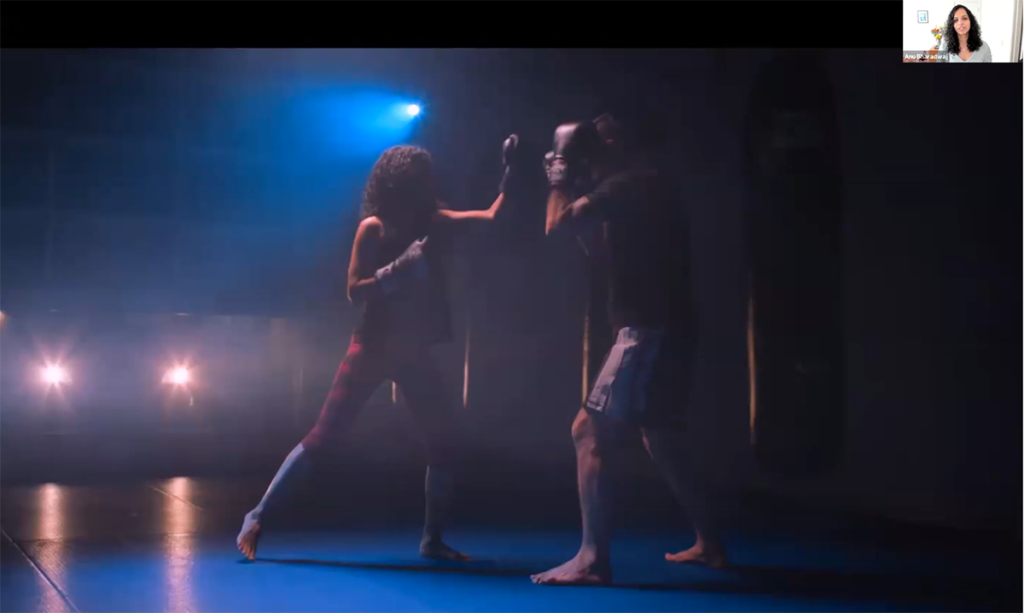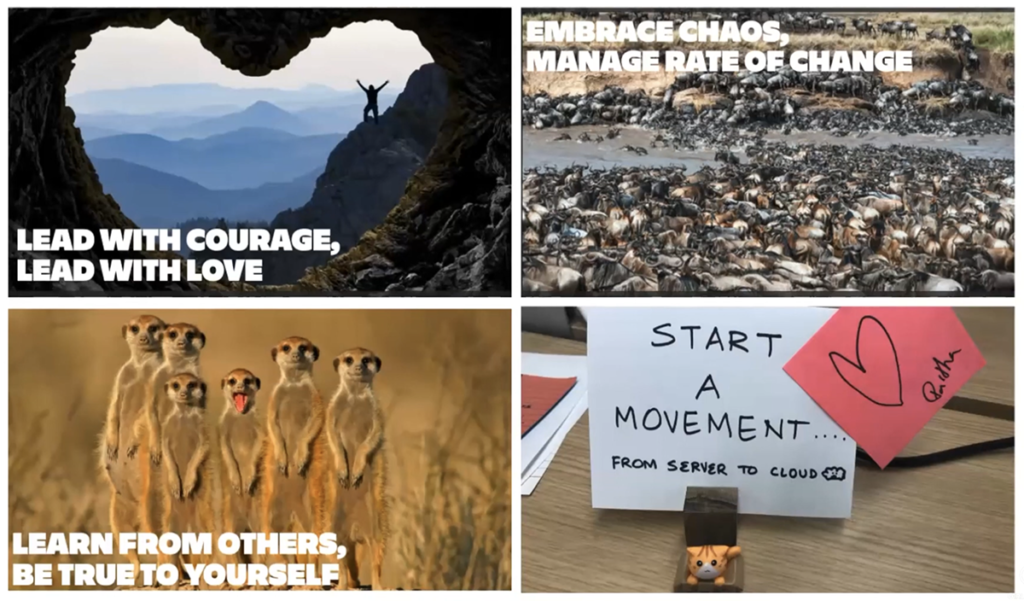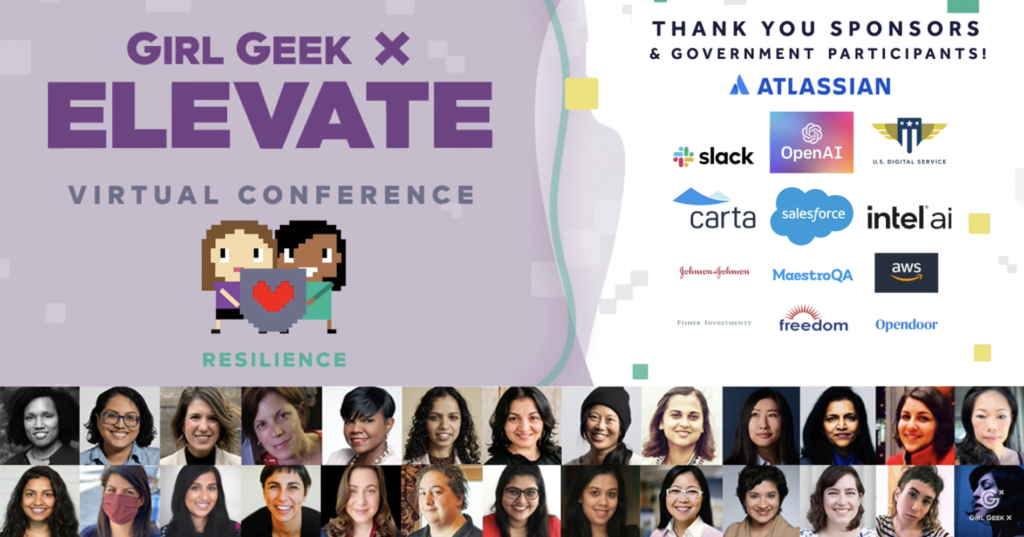VIDEO
Anu Bharadwaj (VP of Product at Atlassian) shares tips of how, with a big dose of empathy and love, you can find the courage to cut through the bullshit and thrive in times of change.
Like what you see here? Our mission-aligned Girl Geek X partners are hiring!
- See open jobs at Atlassian and check out open jobs at our trusted partner companies.
- Watch all Elevate 2021 conference video replays!
- Does your company want to sponsor a Girl Geek Dinner? Talk to us!
Transcript
Angie Chang: We are going to turn it over to Anu. She is the VP of Product at Atlassian. She leads the enterprise business at Atlassian across product lines and also runs a cloud platform team and she’s an accomplished executive with a track record of growing $500 million businesses, building great teams, and shipping blockbuster products. Anu joined Atlassian as a Head of Product for Jira and held a variety of roles at Atlassian and currently serves as the Director of Atlassian Foundation. Welcome, Anu.
Anu Bharadwaj: Thank you so much, Angie. Can everyone hear me?
Angie Chang: Yes.
Anu Bharadwaj: Awesome. Hi, everybody. My name is Anu. Like Angie said, I’m VP of Product at Atlassian. Atlassian is an Australian company. We make collaboration software for teams. I have been at Atlassian for the past seven years and before that I was at Microsoft for 10 years, building developer tools for software teams and Visual Studio for all of your document plans out there.
Anu Bharadwaj: In addition to my day job, I also serve as the Chairperson for Atlassian Foundation, a nonprofit that funds education projects for underprivileged kids worldwide. Today I’m super glad to kick off a Girl Geek X annual event, Elevate, with all of you, wonderful people. I’ve been seeing the chat window. It’s incredible to see what you all done to survive the last year and many of you thrive through it. We’ve had over 3000 registrations for this event today. That’s pretty massive. It’s exciting to be in your company. Our theme at Elevate this year is resilience. And what better theme to choose since the whopper of the year that we’ve had in 2020.
Anu Bharadwaj: Women have always had to be resilient to stay the course in their careers. Resilient to overcome challenges that are unique to us and threaten the thwarters as we rise up. Resulting in far fewer women executives compared to the number of women that start out in entry level roles. Over the last year, that resilience has been further tested as we’ve dealt with the crisis of the pandemic battling to keep work and home running. Today, we come together to celebrate our resilience and hopefully come away inspired to build more reserves of it. So, buckle in as we kick off the day with a big warm welcome to all of you, strong amazing women from all over the world.
Anu Bharadwaj: Let’s start with paying a little bit of attention to the word resilience. Take a moment to reflect on what resilience means to you. People and systems both need a strong dose of resilience to stay healthy. A few months ago, someone came to me and said they were shooting a movie about Silicon Valley technology leaders and how they work and collaborate and build software and teams. They did an interview with me about my work, which was great, and said they’d also like to film what tech leaders do in their spare time to relax and unwind.
Anu Bharadwaj: Angie talked about how she likes to meditate. They asked me, “Do you like to do yoga or play music or meditate just to calm your mind? What do you like to do? And we would like to film you doing that.” And I said, “I kickbox.” It wasn’t quite what the movie director expected, but the camera crew did come to my gym to shoot a video of me while I was fighting.

Anu Bharadwaj: I’ve learned martial arts for many years since I was a kid. And to me, this is indeed a way that I relax and unwind. I’m bringing this up though, because as a kid, when I started learning martial arts, I wasn’t very good at it. When I wanted to give up, my mom said, “Anu, when someone tells you that you’re beautiful or smart, how do you feel?”
Anu Bharadwaj: Beauty and intelligence are lucky qualities that you inherited, but they aren’t anything to be proud of. But when someone says you’re kind or resilient, how do you feel? When you’re kind, you made a choice to care for another person, a choice to be proud of and when you’re resilient, you accomplish something in the face of difficulties. You won your kickboxing match despite losing before. That is something to be proud of.” Now more than ever I appreciate the wisdom of her words.
Anu Bharadwaj: Resilience is the capacity to deal with setbacks yet continue to grow. It is also the cornerstone of mental health. Good mental health does not mean never being sad. It means having the ability to cope with the vagaries of life without being paralyzed by them. But why do we have to talk about resilience as a group of women? As a young woman, starting out in technology, I saw women’s groups around me and I didn’t understand it. I didn’t get it. I thought, why do they need a group? I was raised with the idealistic and naive notion that men and women are born equal and are treated as such.
Anu Bharadwaj: Now 17 years later, I acknowledge the privilege of the sheltered childhood and I’m grateful for it. I graduated with a computer science degree, like Sukrutha talked about. When Microsoft hired me from school for my first job, I was an engineer. I was ready for it and they said, my first job was to write code for video games [inaudible]. When I heard the job description, I was like, you pay me for this shit? I’ll do this job for free.
Anu Bharadwaj: When I started out, it felt strange to see fewer women engineers at work than men, but the thrill of checking in core to a system that millions of people use day in and day out, felt incredible enough to forget any discomfort. People asked me about my job and what I do at work. I get the occasional remark that I learned to ignore. Like, “Oh, a girl developer, or you might want to comb your hair so your office workers take you seriously.” Or speaker feedback like, “The talk was very technical, but having an attractive speaker deliver it was a good idea.”
Anu Bharadwaj: I cried at that speaker feedback. I’ve worked so hard on creating the content for my talk, but the feedback had reduced me to a mouthpiece. I wish I could say these were exceptions, but unfortunately, as I’m sure you’ve all experienced, they’re not. Through seventeen years of my career, I’ve faced a slew of them. “You’re a woman yet you’re good at Math.” “But you’re a female manager, I expect you to be more caring and warm.” “Can you smile more in meetings? You need to be better light.”
Anu Bharadwaj: Like any average person, I have strengths and weaknesses that I try to improve on. As I diligently worked on the feedback I received, I grew increasingly frustrated with how unfair it was. I was intimidating, but a man exhibiting the same behavior was an assertive leader. Turns out I was not alone. Nearly all my women coworkers were going through a similar obstacle race of double standards.
Anu Bharadwaj: What’s worse, unconscious bias did not spare women either. There were many instances of women judging other women unfairly. That’s when inspiration struck. One of my favorite childhood PC games is Wolfenstien 3D. I’m not sure if any of you played this before, but I loved playing this on my PC Pentium 486. It had four interestingly named difficulty levels, the image at the bottom. So the gamer in me decided that being a woman is like playing a video game at the highest level of difficulty. AKA Beast Mode. Sure. Others may have it easier, but I’m going to blaze a trail of glory, defeating 3X the monsters that mere mortals do. Yeah! Bring them on.
Anu Bharadwaj: I confess that this kind of thinking also helped with my guilt. Having worked with nonprofits for over a decade. I understand how severe gender inequity is. Women lose wealth, health, and even in their lives due to this. It gets worse for women of color.
Anu Bharadwaj: Compared to that, surely the inconvenience I faced in my cushy little tech job as an engineer was too insignificant to matter. But there is no hierarchy of suffering. Injustice, no matter big or small, should not be normalized. So while playing in Beast Mode can be gratifying for all of you gamers out there, I’m sure you will agree. It should be a choice, not a default expectation.
Anu Bharadwaj: To win in Beast Mode, we need allies. In the recent hackathon, we rounded up as many allies at Atlassian as we could. We called it our Atlassian allies Trello board. This is a virtual gathering of men and women that are willing to help sponsor, mentor, and champion women. As we power through various levels of career, no matter which function we are, allies also help identify and reinforce sources of resilience while sharing their own sources. Like I spoke before, I will share three of my sources of resilience today and hope that this sparks some inspiration for you to think about how to fortify your own sources of resilience.
Anu Bharadwaj: Starting with lead with your strengths. In 2016, when travel was still a thing…Wow, do you actually remember those times, when we could get on a plane and fly? I took one year off. I took all of 2016 off as a sabbatical to go work on wildlife conservation projects around the world. I’m a bit of an animal nerd. I love working with animals. I worked with penguins in Antarctica, rehabilitated lions in Africa, set up traps to capture cheetahs in Namibia so we could put GPS collars on them and protect them from poaching.

Anu Bharadwaj: And through this time I was introduced to an organization called IAPF, Africa’s first all women, anti-poaching unit. When the founder of IAPF, an army veteran started setting up anti-poaching units, he noticed that the units with women performed way better protecting wildlife than men. Despite the job traditionally being held only by men. He noticed that the women were better at convincing the community to protect wildlife for their own economy. They were more creative in coming up with solutions that didn’t need force and more courageous in ferociously protecting the animals entrusted to their care.
Anu Bharadwaj: He turned around and created an all women anti-poaching unit. They’re called Akashinga, which means Brave Ones. These are women who have had to be deeply resilient in overcoming abuse, poverty, and trauma. When you notice how they build this resilience, the first thing they do is lead with their strengths, courage, creativity, and collaboration. Often on the quest for growth, we focus on our weaknesses and work hard to round them off. While this is important, it is also important to remember that your strengths are your greatest asset.
Anu Bharadwaj: The reason they’re your strengths is because you are happiest, most productive and engaged while using them. Focusing on using your strengths, allows you to operate from a place where you have the resilience to successfully overcome your weaknesses and further build out your skills. Over the past few years, I’ve been leading a big change at Atlassian. We shifted our company from an entirely on-premise product line to cloud native SaaS offerings.
Anu Bharadwaj: This might be not just a technical rewrite of our cloud platform, but a fundamental shift in the DNA of our company. How we build our products, run our products, sell our product, support our products. What we measure in financial and operational metrics. For a company at nearly $2 billion run rate, 7,500 employees, and millions of active users. This meant an all encompassing change. As I pondered the responsibility for leading this technological and business shift, it was scary to think about the enormity of this change.
Anu Bharadwaj: When you think of crucial issues, there is often a range called the Overton window. Typically, the view held by the public tends to be on some range of either left or right of current status score. This is where normalcy is. Take, for example, climate change, racial inequality. Most people acknowledge it’s a problem. Some believe we should take strong measures, some advocate leniency. But overall, there are reasonable policies in a spectrum that most people subscribe to.
Anu Bharadwaj: When you start a movement like civil rights or anti-racism, you have a chance to pull that window in one direction or another. As a leader, you have to shift the frame of reference that the general public starts to realize that the radical option, the unthinkable option is not really as unthinkable as we imagined, shifting the frame of reference of an entire population. That is the stuff that social movements are made of. For a smaller moment like a cloud shift at Atlassian, the same principle applies where you shift thinking from let’s hedge our bets across server on-premise and cloud to let’s go all in on cloud.
Anu Bharadwaj: As a leader, my personal style is to be the activist. The person that shifts the Overton window. Doing that energizes me and drives me to work even harder at making ambitious results possible. A few years ago, it was unthinkable to have majority of customers on cloud.

Anu Bharadwaj: Today over 95% of our customers choose our cloud products. Dozens of our largest enterprise customers start on cloud right away instead of waiting to migrate. Leading the cloud shift at Atlassian has allowed me to exercise my skills. Where I didn’t just lead with courage, but also lead with love as entire teams inside and outside Atlassian had to fundamentally change their business model and way of working. Such change can be scary, but when met with empathy and integrity, people realize that this change is possible.
Anu Bharadwaj: Change can be messy and chaotic, but it can also be real there towards progress. Ultimately, when you start a movement as a leader, people follow you when you deploy your strengths to help others. I have found that choosing work that will challenge you by letting you lead with your strengths is a good way of maintaining energy and growth. It keeps you resilient enough to learn from setbacks and to remain pressing on progress. Even when you find the work to be difficult. If you consistently find yourself spending most of your time doing work that you hate at work, that doesn’t utilize any of your net strengths, that is a red flag for burnout.
Anu Bharadwaj: The second source of resilience I fall back on is self-care. Self-care is never selfish. It is merely good stewardship of the sole resource that you have to serve others and do good in the world. Paying attention to how you feel helps notice sparks of burnout before it turns into a raging fire.
Anu Bharadwaj: Women are typically very good at caring for others, but often ignore themselves. In the name of multitasking, we find it hard to make time for ourselves, but productivity is about managing our energy more than our time. Find the simple acts that restore your energy and replenish you. For me, that is going on a daily run, Telegram chats with my best friend in Sydney, even just my morning coffee and croissant.
Anu Bharadwaj: Making time for yourself among the demands of work and home can especially be hard now in these pandemic-ravaged times, but goes along when building your energy stores, like we talked about at the beginning of a kickoff. The physical isolation of COVID exacerbates feelings of loneliness in all of us. Restoring energy is one thing, but in a world where we cannot be with people we love and feel connected to, paying attention to connectedness is helpful.
Anu Bharadwaj: Personally, I longed for a feeling of connectedness with the universe. For me, it is nature and science that quench the thirst, the mere act of hugging a tree or looking up at the stars, suits me. I marvel at how small we are, yet tightly connected to the fabric of the cosmos. Whether nature, science, religion, or spirituality, find whatever nourishes your inner life and makes you feel connected to a larger whole.
Anu Bharadwaj: My silver lining of working from home, or like Sukrutha said, living at work during the pandemic has been the ability to do silly and fun home projects like this 3D printed picnic bench for squirrels to have a rooftop party. I could literally see them just beyond my monitor, enjoying the sun and seeds outside my window. Made time for your silly source of joy and connectedness.
Anu Bharadwaj: And last but not the least, one big source of resilience for me has been the ability to pay it forward. This is one of my favorite photos with my mother. I lost her to cancer when I was a teenager. When my mother died, she made me promise I wouldn’t quit school, that I would finish my education, get a job and be financially independent. As a teenager, I didn’t understand why she was saying that. I thought, what’s the big deal with education. My dad was the sole breadwinner for a large family, three kids to raise, but thanks to his perseverance I did finish school and landed at a tech job, which ensure and remain financially independent for the rest of my life.
Anu Bharadwaj: What I did not realize as a teenager, I understood fully well as an adult. Education is a slow multi-generational change, but the most sustainable one that we have found yet. Educating girls, in particular, leads to fewer children, healthier families, and overall rising prosperity.
Anu Bharadwaj: The best way we have of making the world a better place is through funding education for girls. Over the past few years, I’ve been doing my small part in that through the Atlassian Foundation. Atlassian Foundation is a nonprofit that funds education projects for underprivileged kids around the world. I started out on the Board of Directors of the foundation five years ago, and now serve as the Chairperson for the board.
Anu Bharadwaj: The work that I do in this role is deeply meaningful to me with the impact on kids’ lives through the grants we fund being immediately obvious. In the past year with COVID, this work has become more important than ever. As girls and women in low income countries have been disproportionately devastated by the pandemic. Giving back and paying it forward helps me retain perspective in distressing times and building resilience to keep going and help others as much as I can.
Anu Bharadwaj: Those were my three sources of resilience: leading with strengths, self-care, and paying it forward. I hope this sparks some inspiration for you to think about your own sources of resilience. I would love to hear what those are. Drop me a line. As we all gather here virtually, here’s an interesting study related to resilience. Typically, we believe that when people experience stress, our instinct is to either stand and fight or flee as fast as possible.
Anu Bharadwaj: Researchers now suspect that women have a larger behavioral repertoire than just fight or flight. It seems that the female stress response has a buffer instead that encourages us to tend and befriend instead. When women become stressed, the response can be to nurture those around them and reach out to others, to build community. How do we go from fight or flight to tend and befriend? That is an interesting question to consider, as we think about how to combat stress and increase resilience.
Anu Bharadwaj: Wrapping up, if there was one thought that I could leave all of you with, here it is. All through the last year we’ve all had difficulties, personal loss and deprivation. When we encounter people day-to-day we have no idea what they have had to deal with. When someone appears distracted, tired, or even angry, respond with love and forgiveness. Remember you got here because someone did this for you and tomorrow someone else will get to where they want to be because of you.
Anu Bharadwaj: With your resilience, help others build resilience around you. I wanted to close this talk with one of my favorite poems that I think about often when I look up at the sky, please pardon my amateur drawing skills. I took out my iPad and pencil and drew this up the woman with a crazy head on the bench is me and the cat beside me is my companion Timtam who’s sleeping there in that little cathouse. We like watching stars with me. The poem goes like this.
Anu Bharadwaj: How should we like it were stars to burn, with a passion for us we could not return? If equal affection cannot be, let the more loving one be me!
Anu Bharadwaj: With that, thank you so much. Love you all. Stay resilient, healthy, and happy, and enjoy the rest of your day at Elevate.
Angie Chang: Thank you so much Anu, that was amazing.

Like what you see here? Our mission-aligned Girl Geek X partners are hiring!
- See open jobs at Atlassian and check out open jobs at our trusted partner companies.
- Watch all Elevate 2021 conference video replays!
- Does your company want to sponsor a Girl Geek Dinner? Talk to us!


